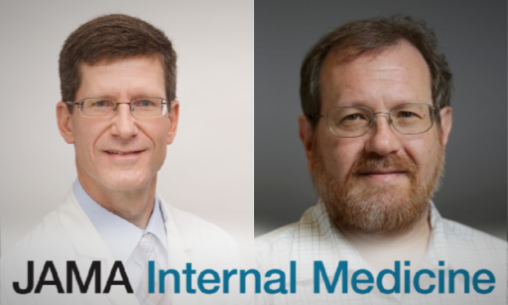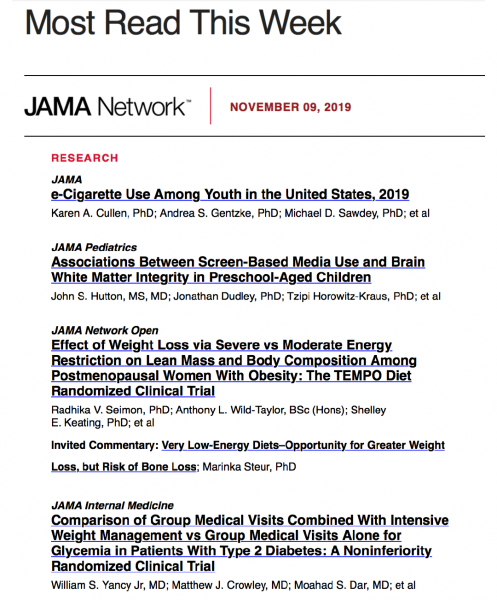
A new RCT involving group visits for diabetes appeared this week in JAMA Internal Medicine. The trial showed that intensive weight management with low carbohydrate diets was as effective in improving blood sugar levels as conventional medication management.
DGIM members, Will Yancy, MD, is the first author and David Edelman, MD, the senior author. The paper is already gaining attention, with an Altmetric score over 400. The results have been picked up by 15 news outlets and tweeted 496 times (as of 11/11/19). It was also highlighted as a most read article in the JAMA Network this week.
Click here to read the full article on the JAMA Internal Medicine website.
Citation
Yancy WS Jr, Crowley MJ, Dar MS, Coffman CJ, Jeffreys AS, Maciejewski ML, Voils CI, Bradley AB, Edelman D. Comparison of Group Medical Visits Combined With Intensive Weight Management vs Group Medical Visits Alone for Glycemia in Patients With Type 2 Diabetes: A Noninferiority Randomized Clinical Trial. JAMA Intern Med. 2019 Nov 4. [Epub ahead of print] PMID: 31682682
Project Summary as stated in the publication
OBJECTIVE:
To examine whether a program of GMVs combined with intensive weight management (WM) is noninferior to GMVs alone for change in glycated hemoglobin (HbA1c) level at 48 weeks and superior to GMVs alone for hypoglycemic events, diabetes medication intensity, and weight loss.
DESIGN, SETTING, AND PARTICIPANTS:
This randomized clinical trial identified via the electronic medical record 2814 outpatients with type 2 diabetes, uncontrolled HbA1c, and body mass index of 27 or higher from Veterans Affairs Medical Center clinics in Durham and Greenville, North Carolina. Between January 12, 2015, and May 30, 2017, 263 outpatients started the intervention.
INTERVENTIONS:
Participants randomized to the GMV group received counseling about diabetes-related topics with medication optimization every 4 weeks for 16 weeks, then every 8 weeks. Participants randomized to the WM/GMV group received low-carbohydrate diet counseling with baseline medication reduction and subsequent medication optimization every 2 weeks for 16 weeks followed by an abbreviated GMV intervention every 8 weeks.
MAIN OUTCOMES AND MEASURES:
Outcomes included HbA1c level, hypoglycemic events, diabetes medication effect score, and weight at 48 weeks analyzed using hierarchical generalized mixed models to account for clustering within group sessions.
RESULTS:
Among 263 participants, baseline HbA1c level was 9.1% and BMI was 35.3. At 48 weeks, HbA1c level was improved in both study arms. The WM/GMV arm had lower diabetes medication use and greater weight loss than did the GMV arm at 48 weeks and approximately 50% fewer hypoglycemic events during the 48-week period.
CONCLUSIONS AND RELEVANCE:
In GMVs for diabetes, addition of WM using a low-carbohydrate diet was noninferior for lowering HbA1c levels compared with conventional medication management and showed advantages in other clinically important outcomes.
